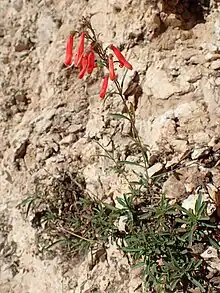Penstemon barbatus
Penstemon barbatus, known by the common names golden-beard penstemon, and beardlip penstemon, is a flowering plant native to the western United States. In Spanish-speaking New Mexico and southern Colorado, it is called varita de San Jose – "St. Joseph's staff".[1]
| Penstemon barbatus | |
|---|---|
 | |
| Scientific classification | |
| Kingdom: | Plantae |
| Clade: | Tracheophytes |
| Clade: | Angiosperms |
| Clade: | Eudicots |
| Clade: | Asterids |
| Order: | Lamiales |
| Family: | Plantaginaceae |
| Genus: | Penstemon |
| Species: | P. barbatus |
| Binomial name | |
| Penstemon barbatus | |
The plant has spikes of clustered, tubular, scarlet blossoms with yellow hairs on their lower lip; the flowers are very attractive to hummingbirds. It is commonly grown in Xeriscape and conventional gardens, and several cultivars of different colors have been developed.
The late-summer flowering of Penstemon barbatus coincides with the southern migration of the Rufous hummingbird, and the hummingbirds use the Scarlet buglers as "filling stations" for their long trip south.[1]
Uses
The Zuni people rub the chewed root of the torreyi subspecies over the rabbit stick to insure success in the hunt.[2]
References
- Dodson & Dunmire, 2007, Mountain Wildflowers of the Southern Rockies, UNM Press, ISBN 978-0-8263-4244-7
- Stevenson, Matilda Coxe, 1915, Ethnobotany of the Zuni Indians. SI-BAE Annual Report #30 (p. 95)